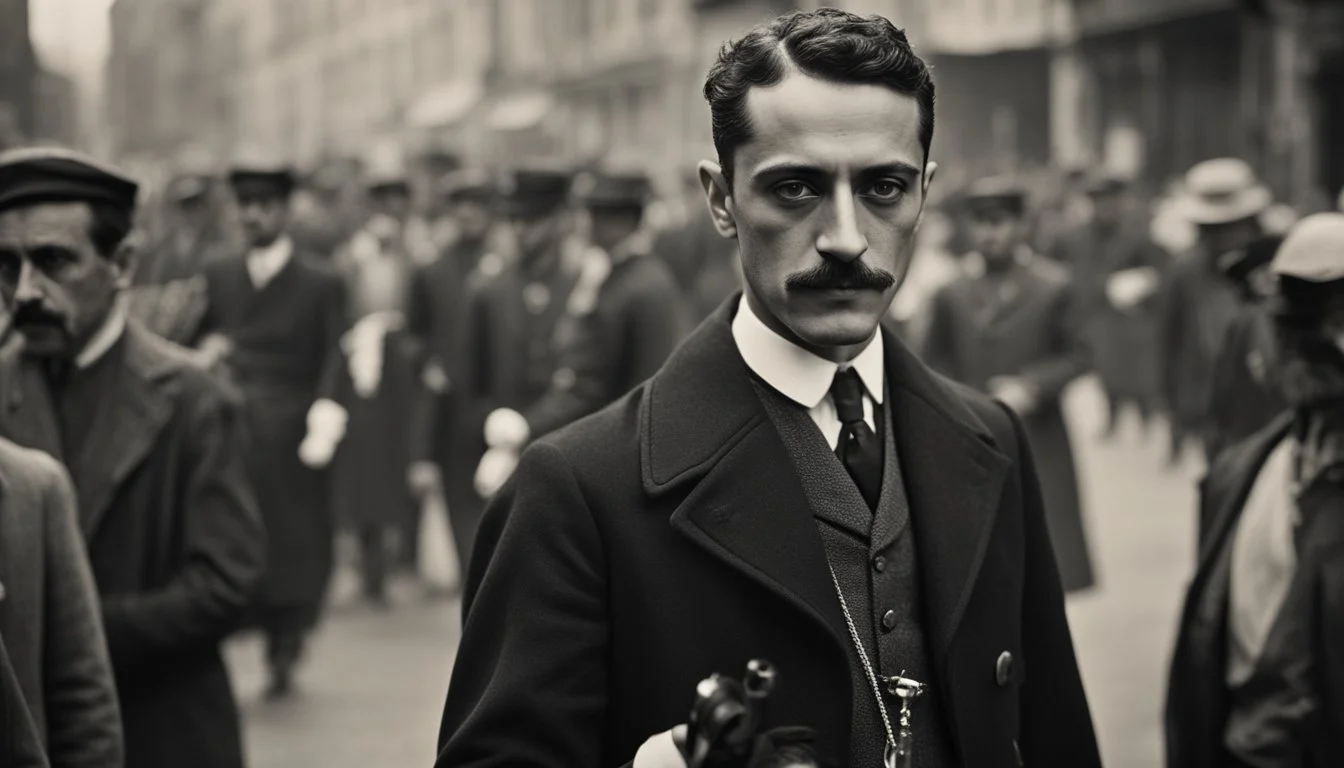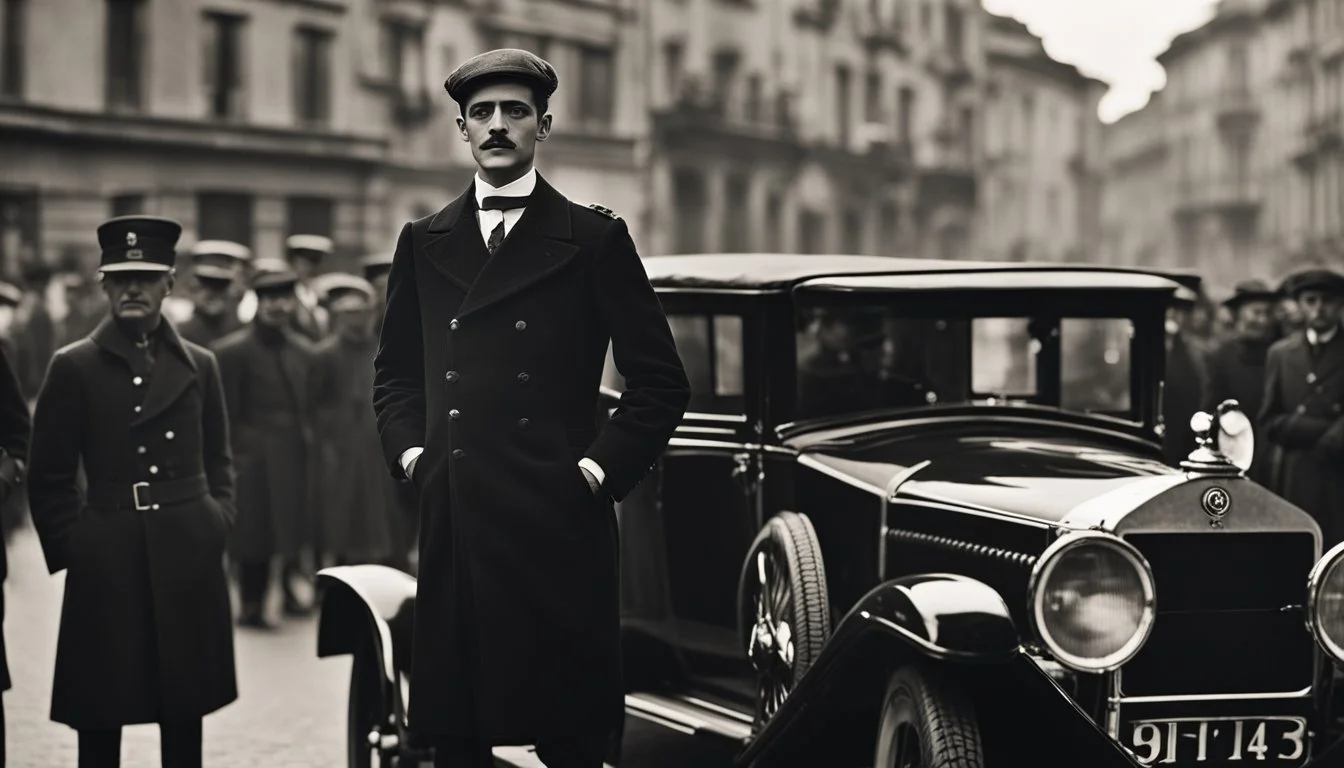5 Documentaries That Unravel the Assassination of Archduke Franz Ferdinand
A Deep Dive into the Spark of World War I
The assassination of Archduke Franz Ferdinand on June 28, 1914, marked a pivotal moment in world history. This event in Sarajevo triggered a chain reaction that led to the outbreak of World War I, reshaping global politics and society for generations to come.
Documentaries offer viewers a unique opportunity to explore the complex circumstances surrounding this fateful day. Through interviews, historical footage, and expert analysis, these films shed light on the motivations of the assassins, the political climate of the time, and the far-reaching consequences of Ferdinand's death. By examining this event from various angles, documentaries help audiences gain a deeper understanding of the factors that plunged Europe into war.
1) The Day That Shook the World (1975)
"The Day That Shook the World" is a historical drama that recreates the events surrounding the assassination of Archduke Franz Ferdinand. Directed by Veljko Bulajić, the film features an international cast including Christopher Plummer and Florinda Bolkan.
The movie meticulously depicts the political tensions in Sarajevo leading up to June 28, 1914. It explores the motivations of the young conspirators and the broader context of Austro-Hungarian rule in Bosnia.
Irfan Mensur portrays Gavrilo Princip, the assassin who fired the fatal shots. The film captures the chaotic aftermath of the assassination and its immediate impact on European politics.
While not strictly a documentary, "The Day That Shook the World" offers a dramatized but historically informed account of this pivotal moment. It provides viewers with a visual understanding of the event that sparked World War I.
The film's attention to period detail and its focus on both the perpetrators and victims of the assassination make it a valuable resource for those interested in this historical turning point.
2) The Assassination of Archduke Franz Ferdinand - Sarajevo, 1914 (2007)
This gripping documentary delves into the pivotal moment that changed the course of history: the assassination of Archduke Franz Ferdinand. Through meticulous research and compelling storytelling, it explores the events leading up to that fateful day in Sarajevo, where Gavrilo Princip's actions ignited the spark that led to World War I.
Featuring expert interviews, rare archival footage, and dramatic reenactments, the film offers an in-depth look at the political tensions and personal motivations behind one of the 20th century's most significant events.
3) Apocalypse: The First World War (2014)
Apocalypse: The First World War is a five-part documentary series that offers a comprehensive look at World War I. The series uses colorized archival footage to bring the conflict to life.
Directed by Daniel Costelle and Isabelle Clarke, the documentary covers the war's origins, including the assassination of Archduke Franz Ferdinand. This event is presented as a catalyst that set off a chain reaction leading to global conflict.
The series draws from over 500 hours of archival material, providing viewers with rare and often unseen footage from the war. It explores various fronts and battles, going beyond the well-known Western Front.
Narrated by Mathieu Kassovitz, Apocalypse: The First World War offers insights into the political alliances and tensions that contributed to the war's outbreak. The documentary examines how a single event in Sarajevo escalated into a worldwide conflict.
The series presents a chronological account of the war, from its beginnings through to its conclusion. It showcases the changing attitudes towards the conflict as it progressed, from initial enthusiasm to growing disillusionment.
4) Sarajevo: The Assassination (2013)
A century ago, in 1914, a single event set the world on a path to a devastating war that would rage for four years and claim 12 million lives. This documentary, "Sarajevo: The Assassination," meticulously examines the catalyst of this disaster—the murder of Archduke Franz Ferdinand, the Austrian heir to the throne, and his wife Sophie on June 28, 1914, in Sarajevo.
Through detailed analysis, expert interviews, and poignant reenactments, the film offers a profound insight into the political intrigue, nationalistic fervor, and personal vendettas that culminated in this tragic event, forever altering the course of history.
5) Death in Sarajevo (2016)
In the heart of Sarajevo, the renowned Hotel Europe is abuzz with anticipation as it prepares to host a significant event on the anniversary of Archduke Franz Ferdinand's assassination—the very act that sparked World War I. The hotel manager anxiously awaits the arrival of Jacques, a distinguished French guest.
Meanwhile, tensions simmer below the surface as kitchen staff, unpaid for months, organize a strike, and a journalist captures the unfolding drama from the rooftop for a television broadcast.
"Death in Sarajevo" weaves together these intersecting narratives, offering a compelling glimpse into the modern-day echoes of a historic tragedy.
Historical Context
The assassination of Archduke Franz Ferdinand occurred during a period of complex geopolitical tensions in Europe. Great powers vied for influence and territory while nationalist movements gained strength across the continent.
The Political Landscape of Early 20th Century Europe
Europe in the early 1900s was dominated by powerful empires and alliances. The Austro-Hungarian Empire, ruled by the Habsburg dynasty, controlled a vast multinational territory in Central Europe.
Germany, unified under Kaiser Wilhelm II, pursued an aggressive foreign policy and naval expansion. This alarmed Britain, which sought to maintain its global dominance.
France, still resentful after its defeat in the Franco-Prussian War, aligned with Russia to counter German influence. The Ottoman Empire struggled to maintain control over its territories in the Balkans.
Smaller nations like Serbia sought independence and unification of Slavic peoples, often clashing with Austria-Hungary's interests in the region.
Tensions Leading Up to the Assassination
Nationalist movements gained momentum across Europe, particularly in the Balkans. Serbia emerged as a fiercely independent state following the Balkan Wars of 1912-1913.
Austria-Hungary annexed Bosnia and Herzegovina in 1908, angering Serbia and Russia. This move intensified Serbian nationalist sentiments and dreams of a unified South Slavic state.
Secret societies like the Black Hand formed in Serbia, advocating for Pan-Slavism and opposing Austrian influence. These groups recruited young nationalists and planned acts of violence against Austro-Hungarian officials.
Archduke Franz Ferdinand's visit to Sarajevo in June 1914 presented an opportunity for these tensions to boil over. The stage was set for an act that would ignite long-simmering conflicts across Europe.
Impact on World War I
The assassination of Archduke Franz Ferdinand had profound consequences, setting in motion events that led to the outbreak of World War I. This act of violence triggered a series of diplomatic crises and military mobilizations across Europe.
How the Assassination Triggered the War
Austria-Hungary blamed Serbia for the assassination and issued an ultimatum. When Serbia failed to meet all demands, Austria-Hungary declared war on July 28, 1914. This activated a complex web of alliances.
Russia mobilized to support Serbia. Germany, allied with Austria-Hungary, declared war on Russia and France. Britain entered the conflict when Germany invaded neutral Belgium.
Within weeks, Europe's major powers were at war. The assassination provided the spark that ignited long-standing tensions and rivalries between European nations.
The Aftermath and Repercussions
World War I lasted four years and resulted in unprecedented destruction. Over 9 million soldiers died, and 21 million were wounded. Civilian casualties numbered in the millions.
The war redrew the map of Europe. Four empires collapsed: German, Austro-Hungarian, Ottoman, and Russian. New nations emerged from their remnants.
The conflict's aftermath shaped the 20th century. It led to the Russian Revolution, the rise of communism, and set the stage for World War II. The assassination in Sarajevo thus had far-reaching consequences that extended well beyond the immediate outbreak of war.
Conspiracy Theories and Debates
The assassination of Archduke Franz Ferdinand has sparked numerous conspiracy theories over the years. Some documentaries explore these controversial ideas, presenting alternative perspectives on the events of June 28, 1914.
One popular theory suggests the assassination was part of a wider plot orchestrated by elements within the Serbian government. This idea has been examined in several films, analyzing potential connections between the Black Hand organization and Serbian officials.
Other documentaries delve into the possibility of involvement from other European powers. These films investigate claims of Russian or British interference, seeking to uncover hidden motives behind the assassination.
Some theories focus on the role of Freemasonry in the events leading to World War I. Documentaries exploring this angle often draw connections between various political figures and secret societies.
The debate over Austria-Hungary's response to the assassination is another common theme. Films examine whether the ultimatum issued to Serbia was deliberately designed to provoke war.
Controversies surrounding the trial of the assassins are also addressed in certain documentaries. These productions scrutinize the legal proceedings and question the fairness of the verdicts.
While many of these theories lack substantial evidence, they continue to captivate audiences and fuel ongoing debates about the true nature of the assassination that sparked World War I.



